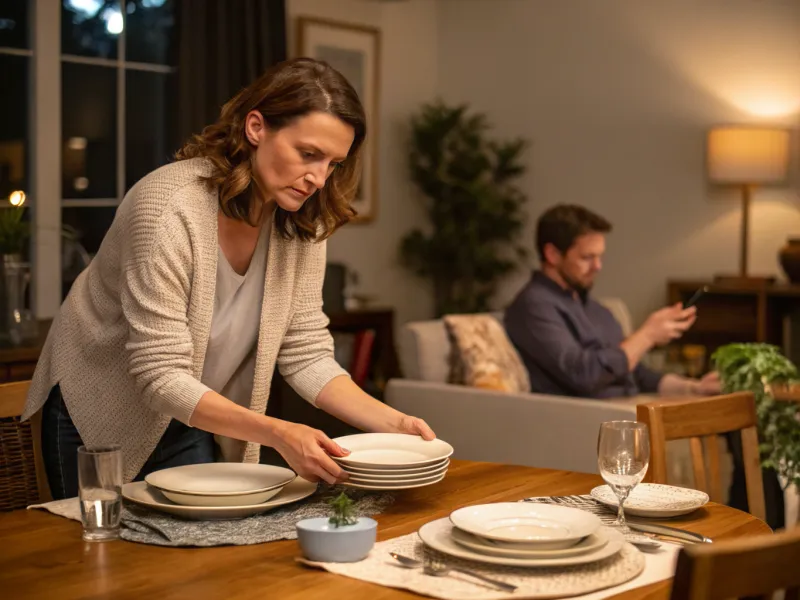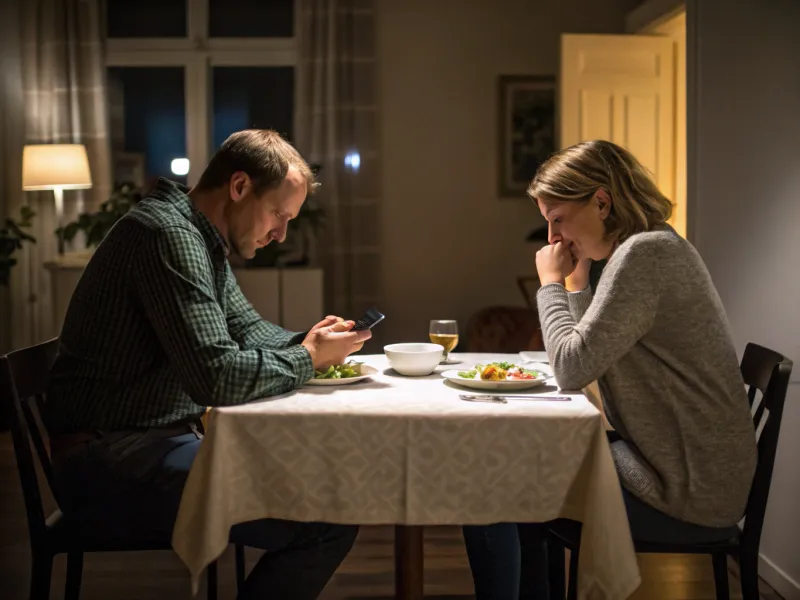33 Painful But Honest Reasons Husbands Stop Loving Their Wives

Let’s get real: marriage isn’t always a smooth sail on a tranquil sea. Sometimes, it’s more like trying to dance the tango on a storm-tossed ship. The reasons husbands fall out of love with their wives can be complex and varied, but understanding them is the first step towards bridging the gap. So, grab a cup of coffee, settle in, and let’s have that heart-to-heart about those painful yet enlightening reasons why love sometimes fades.
1. Communication Breakdown

Communication is the lifeline of any relationship, and when it starts fraying, everything else seems to unravel. Picture this: a couple sitting in their living room, each absorbed in their own world, words stuck in their throats like unspoken ghosts. He feels unheard, she feels misunderstood, and the silence grows thicker than the walls around them. It’s not about shouting matches or slammed doors; it’s the absence of words that eventually screams the loudest.
When conversations turn into a series of grunts or monosyllabic responses, it’s like watching a vibrant garden turn into a desert. The once colorful exchanges now seem like faded photographs of happier times. He wants to share, to express, but feels his words will only bounce back like an echo in an empty room. She wishes for deeper conversations but finds herself caught in the web of mundane chatter.
The key isn’t just to talk more but to talk better. Finding common ground, even in disagreements, and genuinely listening can reignite the spark. It’s about turning ‘How was your day?’ into an invitation for meaningful dialogue.
2. Emotional Needs Unmet

Emotional needs are like the engine oil of a relationship; ignore them, and the whole machine starts clanking and sputtering. Imagine him sitting alone at the dining table, staring at the empty chair across from him. It’s not just the absence of her presence but the void of emotional support that feels like a cold breeze.
He craves connection, not just physically or even verbally, but emotionally. He wants to feel valued, cherished, and understood. Yet, when his emotional needs are brushed aside or belittled, resentment starts to build like a slow, creeping rust. She may not even realize it, caught up in her own whirlwind of responsibilities and stresses.
The truth is, both partners must make a conscious effort to nurture each other’s emotional well-being. Small gestures, thoughtful words, and genuine empathy can go a long way. It’s about recognizing those unspoken needs and responding with love, not just assumptions. After all, a relationship thrives on the emotional bonds that tie two hearts together.
3. Lost Intimacy

Intimacy is the glue that holds a relationship together, and when it starts to dissolve, the bond loosens. Picture a couple in their bedroom, one partner engrossed in a book while the other looks on longingly. It’s not just about physical closeness but the emotional intimacy that seems to have slipped away like sand through fingers.
Physical intimacy often mirrors emotional connection, and when one is lacking, the other usually follows. He misses the spontaneous hugs, the late-night conversations, the quiet assurance of shared secrets. She might be unaware, lost in her thoughts or overwhelmed by daily routines, not realizing that the gap between them is growing wider by the day.
Rekindling intimacy is about creating moments of genuine connection. It’s the shared laughter over a silly joke, the quiet moments of holding hands, or even the comfort of a familiar routine. By prioritizing these small yet significant interactions, couples can rediscover the closeness that once seemed so effortless.
4. Taking Each Other for Granted

Familiarity can be a double-edged sword. On one hand, it breeds comfort; on the other, it can lead to complacency. Imagine her bustling around the house, ticking off chores, while he lounges on the couch, eyes glued to the TV. Neither acknowledges the other’s efforts, each taking the other’s presence as a given.
The problem with taking each other for granted is that it erodes the appreciation and gratitude that are the bedrock of a loving relationship. He stops noticing her little acts of kindness, and she overlooks his silent gestures of affection. Over time, what was once a partnership feels more like a transactional cohabitation.
Reversing this trend requires a conscious effort to appreciate and acknowledge each other. It’s about saying thank you for the little things, recognizing the unseen efforts, and reminding each other of why the relationship is special. A simple note, a small surprise, or just a heartfelt acknowledgment can breathe life back into a relationship that feels stuck on autopilot.
5. Different Priorities

As life progresses, priorities shift, and sometimes they drift apart. Picture a couple sitting on a park bench, each gazing in different directions, lost in their own thoughts. She dreams of travel and adventure, while he’s focused on his career, each pulling in opposite directions without realizing the strain it places on their bond.
It’s natural for people to evolve, but when partners fail to align their priorities, the relationship begins to feel like two ships passing in the night. He wants to invest time in his goals, while she longs for shared experiences and quality time. These unmet expectations can lead to frustration and a sense of being misunderstood.
Finding common ground requires open dialogue and a willingness to compromise. It’s about setting joint goals that honor individual dreams while nurturing the relationship. By actively engaging in each other’s lives and aspirations, couples can find a middle path that satisfies both partners and strengthens their connection.
6. Financial Strain

Money, as they say, makes the world go round, but financial strain can grind a relationship to a halt. Picture a young couple at their kitchen table, bills scattered around like a storm of paper, voices raised in frustration. It’s not just about the zeros in the bank account but the tension and stress that financial woes bring into the home.
He’s worried about making ends meet, she’s concerned about the future, and together they spiral into arguments that leave them both feeling isolated and overwhelmed. The anxiety about money can overshadow every other aspect of the relationship, leading to a cycle of blame and resentment.
Tackling financial strain requires teamwork and transparent communication. Setting a budget together, discussing financial goals, and supporting each other through tough times can alleviate the burden. It’s not just about finding solutions but standing united against the pressures that threaten to pull them apart.
7. Lack of Appreciation

Appreciation is the sunshine that helps love grow, and without it, a relationship can wither like a neglected plant. Imagine her setting the dinner table, the aroma of a carefully prepared meal filling the room, while he’s glued to his phone, oblivious to her efforts. It’s not just the lack of words, but the absence of recognition that stings.
She craves acknowledgment for the countless little things she does, from the meals she prepares to the emotional support she offers. When these efforts go unnoticed, it creates a silent rift, a feeling of being undervalued that gnaws at the heart of the relationship.
Rekindling appreciation involves mindful recognition of each other’s contributions. It’s about expressing gratitude, celebrating small victories, and genuinely acknowledging the efforts that often go unseen. By cultivating a culture of appreciation, couples can strengthen their bond and reignite the love that once seemed effortless.
8. Infidelity

Infidelity is a betrayal that strikes at the very core of a relationship, leaving deep scars that are hard to heal. Picture a couple in a dim room, one partner looking away, guilt etched into their features, while the other stares into the distance, the weight of betrayal heavy in the air.
It’s not just the act itself but the breach of trust that rips through the fabric of love. She grapples with feelings of inadequacy, while he struggles with guilt and shame. The once solid foundation of their relationship now feels like quicksand, uncertain and unstable.
Rebuilding after infidelity requires immense courage and commitment. It’s about open communication, rebuilding trust one step at a time, and seeking professional help if needed. While the path to healing is long and challenging, it’s not impossible for couples willing to confront the pain and work towards forgiveness and reconciliation.
9. Unresolved Conflicts

Unresolved conflicts are like a ticking time bomb in a relationship, waiting to explode at the most unexpected moments. Picture a mature couple in their living room, arms crossed, expressions tense, each entrenched in their own viewpoint, unwilling to budge.
These lingering issues, often swept under the rug, create an undercurrent of tension that can bubble to the surface during the smallest disagreements. It’s the unspoken grudges, the old arguments replayed like a broken record, that slowly erode the love that once flowed freely.
Addressing unresolved conflicts requires courage and a willingness to listen with an open heart. It’s about setting aside pride, acknowledging mistakes, and working together towards a resolution. By confronting these issues head-on, couples can clear the air and make space for love to flourish once more.
10. Emotional Distance

Emotional distance doesn’t happen overnight; it creeps in like a slow fog, obscuring the closeness that once defined the relationship. Imagine a couple sitting on a park bench, each absorbed in their phone, the silence between them louder than any words.
He feels disconnected, she feels isolated, and the gap between them widens with each passing day. It’s not just about physical proximity but the emotional chasm that leaves both partners feeling unmoored and adrift. The once vibrant connection now feels like a faint echo of what it used to be.
Bridging emotional distance takes effort and intention. It’s about putting down the distractions, engaging in meaningful conversations, and actively participating in each other’s lives. By nurturing emotional connectivity, couples can transform the fog of detachment into the clarity of renewed closeness.
11. Different Life Stages

Life doesn’t always move at the same pace for everyone, and different life stages can pull couples in divergent directions. Picture a young couple at a crossroads, one holding a baby, the other clutching a briefcase, both facing different paths.
She’s immersed in the world of diapers and sleepless nights, while he’s focused on career advancement and personal growth. The imbalance of life stages can create a disconnect, leaving one partner feeling left behind or unsupported.
Navigating different life stages requires empathy and understanding. It’s about acknowledging the unique challenges each partner faces and offering support rather than judgment. By embracing each stage with open communication and mutual respect, couples can find harmony even amidst life’s ever-changing dynamics.
12. Neglecting Self-Care

Neglecting self-care isn’t just about skipping a spa day; it’s about losing touch with oneself. Imagine her staring into the mirror, surrounded by beauty products, yet feeling a world apart from the person she used to be.
He notices the change, the absence of the vibrant spirit that first drew him to her, but might not realize it stems from her neglecting her own needs. She’s so busy caring for everyone else that she’s forgotten how to care for herself.
Reclaiming self-care is about rediscovering joy and balance. It’s not selfish to prioritize one’s own well-being; in fact, it’s essential. By taking time to nurture her own spirit, she can bring renewed energy and positivity into the relationship. After all, a healthy relationship starts with healthy individuals.
13. Mismatch in Values

Values are the compass that guides a relationship, and a mismatch can lead to uncharted waters. Picture a mature couple in their living room, one engrossed in a religious book, the other in a science magazine. Their differences are more than just hobbies; they’re a clash of fundamental beliefs.
She values spirituality and tradition, while he leans towards logic and modernity. These conflicting values can create tension and misunderstanding, each partner feeling like they’re constantly swimming against the current.
Finding harmony in a values mismatch requires respect and open dialogue. It’s about acknowledging differences without trying to change each other, and finding common ground where possible. By focusing on shared values rather than differences, couples can navigate their relationship with mutual respect and understanding.
14. Overbearing Family Influence

Family can be both a support and a stressor, especially when their influence becomes overbearing. Imagine a couple having dinner with parents, smiles plastered on their faces, but tension simmering beneath the surface.
He feels pressured by expectations, she feels smothered by advice, and together they feel like their relationship is being navigated by a committee. The constant interference can create a wedge, eroding the autonomy and intimacy that are vital for a healthy partnership.
Establishing boundaries with family requires assertiveness and unity. It’s about presenting a united front and ensuring that external influences don’t override the couple’s own decisions. By respecting each other’s family while prioritizing their relationship, couples can maintain a healthy balance and protect their bond.
15. Lack of Shared Interests

Shared interests are like the threads that weave a couple’s lives together, and when they fray, the fabric becomes loose. Picture a couple on a couch, one watching sports, the other engrossed in a novel, worlds apart despite being side by side.
He misses the shared activities, the joy of doing things together, while she’s content in her solitude, pursuing her own interests. The absence of common hobbies can lead to a feeling of detachment, each partner living parallel lives without intersection.
Reviving shared interests takes creativity and willingness to explore. It’s about finding new activities that both enjoy, or rekindling old ones that brought joy in the past. By creating opportunities for shared experiences, couples can reinforce their connection and enjoy each other’s company anew.
16. Loss of Personal Identity

Losing oneself in a relationship can feel like fading into the background of your own life. Imagine her flipping through old photos, a reflective look in her eyes, searching for the person she once was.
He notices her change, the way she seems to have lost her spark, but can’t pinpoint why. She’s given so much to the relationship that her own identity has been put on hold, leading to a sense of loss and dissatisfaction.
Rediscovering personal identity is about reconnecting with old passions and exploring new interests. It’s about carving out time for oneself, even within a partnership, and embracing both individuality and togetherness. By nurturing her own identity, she brings renewed vitality and happiness into the relationship.
17. Physical Neglect

Physical neglect in a relationship is more than just letting appearances slide; it’s about losing the desire to present oneself to the world. Picture him gazing into the bathroom mirror, self-conscious about the changes in his appearance.
She might not notice, or perhaps she does but doesn’t comment, assuming it doesn’t matter. However, physical neglect can signify deeper issues, a lack of self-esteem or motivation that affects not just personal confidence but the relationship as a whole.
Reversing physical neglect requires self-acceptance and care. It’s about making choices that reflect love for oneself, whether through exercise, grooming, or simply dressing in a way that feels good. By taking steps to feel good physically, he can enhance his emotional well-being and contribute positively to the relationship.
18. Comparisons to Others

Comparing your relationship to others is like trying to fit a square peg into a round hole. Imagine a couple at a party, one partner eyeing another couple with envy, the weight of comparison heavy on their shoulders.
In the age of social media, it’s easy to fall into the trap of measuring one’s relationship against others. He sees the laughter and perceived perfection of others, while she feels pressured by unattainable standards. This comparison steals joy and breeds dissatisfaction, creating a divide where there shouldn’t be one.
Breaking free from comparisons requires focusing on the uniqueness of your own relationship. It’s about celebrating individual strengths and quirks that make the partnership special. By embracing what makes their relationship uniquely theirs, couples can find contentment and joy that comparisons can never offer.
19. Lack of Quality Time

Quality time is the heartbeat of a relationship, and without it, love can feel distant and waning. Picture a young couple at a bustling café, each absorbed in their phone, the world outside more engaging than the person sitting across.
They’re together but not truly present, the connection having taken a back seat to distractions and busyness. He misses the laughter and shared moments, while she feels the absence of meaningful engagement.
Prioritizing quality time means making intentional choices to connect. It’s about setting aside technology, planning dates, and engaging in activities that foster closeness. By carving out time for genuine interaction, couples can rejuvenate their connection and keep their love alive.
20. Stress and Burnout

Stress and burnout can sap the energy from a relationship faster than you can say ‘overwhelmed.’ Picture a couple slumped over a cluttered desk, exhaustion etched into their features, each carrying the weight of stress on their shoulders.
The demands of work, family, and life in general can leave them both feeling drained, with little energy left for each other. Resentment builds as they both silently wish for support but are too worn out to provide it.
Combating stress requires teamwork and self-care. It’s about recognizing the signs of burnout and supporting each other through the tough times. By prioritizing relaxation and finding ways to decompress together, couples can alleviate stress and maintain a healthy, loving relationship.
21. Unmet Expectations

Expectations can be a tricky beast, often lurking beneath the surface until disappointment rears its head. Picture her sitting with a stack of self-help books, eyes full of unvoiced dreams and unmet expectations, while he sits unaware of the gap between them.
She’s built castles in the air, hoping for a partner who reads her mind, while he’s content, blissfully unaware of her unspoken desires. This disconnect can lead to resentment and frustration, creating a chasm that feels insurmountable.
Bridging the expectation gap requires open communication and realistic goal-setting. It’s about discussing hopes and dreams openly, aligning goals, and working together to fulfill each other’s needs. By addressing expectations head-on, couples can transform disappointment into satisfaction and understanding.
22. Jealousy and Insecurity

Jealousy and insecurity can wrap around a relationship like a vice, leaving both partners gasping for trust. Picture a young couple at a social event, one partner’s eyes darting suspiciously while the other tries to engage in conversation, the tension palpable.
These feelings often stem from personal insecurities projected onto the relationship, leading to accusations and mistrust. He feels scrutinized, she feels accused, and the cycle continues, eroding the trust that forms the foundation of their love.
Addressing jealousy requires self-reflection and reassurance. It’s about building self-esteem and reinforcing trust through consistent, open communication. By cultivating a sense of security and confidence, couples can break free from the chains of jealousy and foster a trusting, loving relationship.
23. Unfulfilled Dreams

Unfulfilled dreams can hang over a relationship like a rain cloud, casting a shadow on even the sunniest days. Picture her gazing out of the window, dreams unspoken, while he’s immersed in the mundane pages of a newspaper.
She wonders what might have been, the paths not taken, the goals left to gather dust. He’s content, unaware of the dreams she’s shelved for so long, the sacrifices made in silence. This sense of unfulfillment can lead to regret and resentment, a longing for more than what currently is.
Reviving dreams involves honest conversations and mutual support. It’s about recognizing and nurturing each other’s aspirations, finding ways to integrate them into the fabric of their shared life. By encouraging each other’s dreams, couples can transform what feels like missed opportunities into fulfilled ambitions.
24. Routine and Monotony

Routine can be comforting, but when it turns to monotony, it can stifle the spark of love. Imagine a couple at their breakfast table, the daily grind evident in their eyes, each day blending into the next with little excitement.
He misses the spontaneity, the days of adventure and surprise, while she longs for something to break the cycle of sameness. The predictability of life becomes a weight, pulling them both into a rut that feels difficult to escape.
Injecting variety into daily life requires creativity and effort. It’s about stepping outside comfort zones, planning spontaneous outings, or even just changing up the daily routine. By embracing new experiences together, couples can reignite the excitement and keep their relationship dynamic and alive.
25. Neglect of Romance

Romance is the heartbeat of love, and neglecting it can leave a relationship feeling flat and lifeless. Picture a couple in a candlelit restaurant, the ambiance perfect, yet both are glued to their phones, missing the romance waiting to unfold.
He misses the sweet gestures, the surprise dates, the love notes that once were plentiful. She feels the absence of attention, the little touches and whispers of affection that used to make her heart flutter.
Reviving romance requires intention and creativity. It’s about planning special moments, expressing love in unexpected ways, and keeping the spark alive. By prioritizing romance, couples can maintain the vibrancy of their love and deepen their connection.
26. Miscommunication

Miscommunication is like a game of broken telephone, where messages get lost in translation. Picture a couple at a bustling coffee shop, both talking at once, neither truly hearing the other, the noise around them mirroring the confusion.
He feels misunderstood, she feels unheard, and the attempts to connect end in frustration. The words spoken are not the words received, leading to a cycle of arguments and hurt feelings.
Improving communication requires active listening and patience. It’s about pausing to truly hear, clarifying intentions, and ensuring understanding. By fostering clear and empathetic dialogue, couples can cut through the noise and strengthen their bond.
27. Emotional Over-dependence

Emotional over-dependence can feel like carrying a weight that’s not yours to bear. Imagine one partner leaning heavily on the other, the burden of constant support etched into their features.
She feels overwhelmed, he feels needed but not cherished, and the balance of give and take feels off-kilter. This dynamic can lead to strain, as the over-depended partner longs for space and the dependent partner fears loss of connection.
Finding balance requires self-awareness and mutual support. It’s about fostering independence alongside interdependence, ensuring each partner feels strong on their own as well as together. By nurturing both individuality and partnership, couples can create a healthier, more fulfilling connection.
28. Different Parenting Styles

Parenting is a journey, and when styles clash, it can lead to turbulence. Picture parents in their late 30s, one scolding a child while the other looks on with disapproval, their disagreement palpable.
She believes in gentle guidance, he values discipline, and their differing approaches create tension and inconsistency. The child feels the divide, and the couple struggles to present a united front.
Harmonizing parenting styles requires compromise and communication. It’s about finding common values and creating a parenting plan that respects both perspectives. By working together, couples can build a cohesive strategy that benefits their children and strengthens their partnership.
29. Lack of Adventure

Adventure adds zest to life, and its absence can make a relationship feel stagnant. Imagine a couple surrounded by travel brochures, captivated by dreams of adventure yet hesitant to step out of their comfort zone.
He longs for excitement and new experiences, she dreams of distant lands but fears the unknown. The unfulfilled desire for adventure can lead to restlessness and a feeling of being stuck.
Injecting adventure into a relationship requires courage and imagination. It’s about planning trips, trying new activities, and embracing the thrill of the unknown together. By making adventure a part of their lives, couples can keep their relationship vibrant and full of life.
30. Dishonesty

Dishonesty is a poison that can corrode the very essence of a relationship. Picture a couple sitting at opposite ends of a table, one partner subtly hiding a phone, the air thick with unspoken truths.
Trust is the cornerstone of love, and lies, even small ones, chip away at that foundation. She feels deceived, he feels trapped, and the web of dishonesty entangles them both in a cycle of mistrust.
Rebuilding trust requires honesty and transparency. It’s about owning up to mistakes, being truthful, and committing to open communication. By fostering an environment of honesty, couples can heal wounds and rebuild the trust crucial for a healthy relationship.
31. Household Chore Resentment

Resentment over household chores is a surprisingly common issue. Imagine a husband overwhelmed by a never-ending list of chores, while his wife seems unbothered, engrossed in a novel. Such situations can brew silent resentment. While love can be deep, everyday frustrations can chip away at it.
Compromise and understanding are essential to manage household responsibilities. When one feels overburdened, it can symbolize deeper issues of imbalance or neglect. Partners need to communicate openly about sharing tasks, ensuring neither feels overwhelmed. Small adjustments can restore balance, preventing resentment from festering.
Ultimately, chores might seem trivial, but they highlight the importance of partnership.
32. Clashing Aesthetic Preferences

Aesthetic preferences can surprisingly impact marital harmony. Imagine a couple where one partner loves minimalist designs, while the other revels in vibrant colors and eclectic patterns. These differences, though seemingly superficial, can cause friction.
When personal spaces don’t reflect mutual tastes, one might feel alienated in their own home. It’s essential for couples to find common ground in their living space. This creates a sense of belonging and shared identity within the home.
Compromise and creative solutions, like blending styles, can ensure both partners feel comfortable and represented, preventing aesthetic clashes from becoming deeper issues.
33. Overenthusiastic Hobby Pursuit

Enthusiasm for hobbies can sometimes go overboard. Picture a husband passionately involved in building an expansive model train set, consuming weekends and evenings. His wife might feel sidelined, leading to feelings of neglect.
Hobbies should enrich life, but not at the expense of marital connection. It’s important to maintain a balance between personal interests and shared time with a partner.
Communication about hobby boundaries ensures that both partners’ needs are met. Thus, hobbies can remain joyful pursuits rather than sources of marital strain. Balance and mutual respect can prevent hobbies from becoming divisive.
